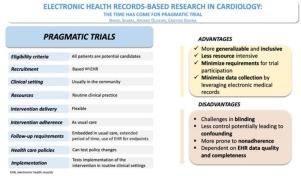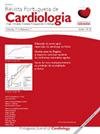心脏病学中基于电子健康记录的研究:进行实用试验的时候到了。
IF 1.6
4区 医学
Q3 CARDIAC & CARDIOVASCULAR SYSTEMS
引用次数: 0
摘要
随机临床试验(RCTs)是循证医学的基石,因为它们最大限度地减少了干预措施分配的偏倚。然而,在选择性人群和过度控制条件下进行的随机对照试验可能会损害结果的普遍性。此外,不断增加的运行成本和监管复杂性也影响了这些研究的开展。对实用的试验设计、简化程序和低运行成本的需求,将决定随机对照试验研究的短期未来。电子健康记录(EHR)是作为患者治疗的一部分常规收集的。它们以不高的成本提供大量数据。所谓的“真实世界的数据”通常用于具有不可避免的偏差的观察性研究。然而,通过将大量患者的随机化与电子病历中收集的数据相结合,可以以相对较低的成本回答非常相关的临床问题。在这篇综述中,我们描述了电子病历和随机化的整合如何促进心脏病学中随机对照试验的创新方法。本文章由计算机程序翻译,如有差异,请以英文原文为准。

Electronic health records-based research in Cardiology: The time has come for pragmatic trials
Randomized clinical trials (RCTs) are the cornerstone of evidence-based medicine, as they minimize bias in the allocation of interventions. However, RCTs performed in a very selective population and overcontrolled conditions may impair the generalizability of results. Moreover, increasing running costs and regulatory complexity compromise the conduct of these studies. The need for pragmatic trial designs, with streamlined procedures and low running costs, will shape the short-term future of research in RCTs.
Electronic health records (EHR) are routinely collected as part of the treatment of patients. These provide large amounts of data at no significant cost. The so-called “real-world data” are often used in observational studies with unavoidable bias. However, by combining the randomization of large numbers of patients with the data collected in EHRs, it is possible to answer very relevant clinical questions at a relatively low cost.
In this review, we describe how the integration of EHR and randomization is fostering innovative approaches to the conduct of RCTs in Cardiology.
求助全文
通过发布文献求助,成功后即可免费获取论文全文。
去求助
来源期刊

Revista Portuguesa De Cardiologia
CARDIAC & CARDIOVASCULAR SYSTEMS-
CiteScore
2.70
自引率
22.20%
发文量
205
审稿时长
54 days
期刊介绍:
The Portuguese Journal of Cardiology, the official journal of the Portuguese Society of Cardiology, was founded in 1982 with the aim of keeping Portuguese cardiologists informed through the publication of scientific articles on areas such as arrhythmology and electrophysiology, cardiovascular surgery, intensive care, coronary artery disease, cardiovascular imaging, hypertension, heart failure and cardiovascular prevention. The Journal is a monthly publication with high standards of quality in terms of scientific content and production. Since 1999 it has been published in English as well as Portuguese, which has widened its readership abroad. It is distributed to all members of the Portuguese Societies of Cardiology, Internal Medicine, Pneumology and Cardiothoracic Surgery, as well as to leading non-Portuguese cardiologists and to virtually all cardiology societies worldwide. It has been referred in Medline since 1987.
 求助内容:
求助内容: 应助结果提醒方式:
应助结果提醒方式:


